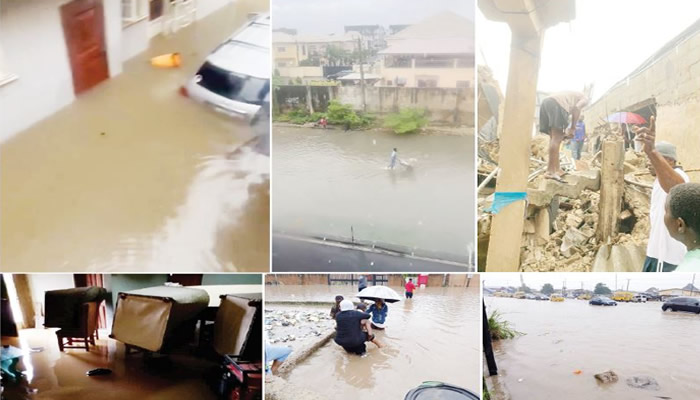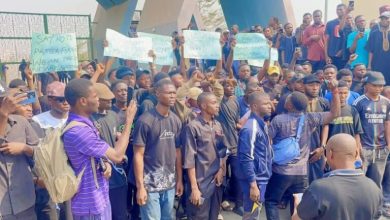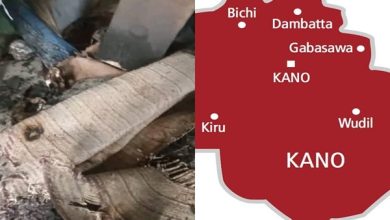10-Hour Rainfall: Lekki, Ikoyi Residents Flee Mansions As Flood Ravages Homes

Residents of highbrow Lekki, Ikoyi and Ajah areas in Lagos have had to suffer losses after flooding caused by heavy rainfall.
Streets became streams. Reptiles came out to play in the floodwater that overflowed roads and seeped into the homes of the rich, forcing them to leave their palatial mansions for hotels. On Wednesday, July 4, 2024, the skies didn’t stop to cry for more than 10 hours.
The rains continued that evening and caused relentless flooding. By Thursday, floating furniture, TVs, mattresses and children’s toys were sighted in several videos posted online.
In several of those online videos, many residents showed how they had to wade through murky waters to leave their homes.
A particular woman, who said her name was Mrs Shade, lamented how she had lost everything in a home she paid a rent of N3.5m every year for. A short tour around her house showed it was a two-bedroom apartment with a balcony and an extra bathroom.
When contacted on Facebook, she told our correspondent that she paid an agent fee of N250,000 when she moved in October 2023.
“I haven’t even stayed up to one year in the house. I have lost everything. From my TV to my new fridge, my furniture, my mattress and every valuable I have used more than 10 years of my life to build are all gone,” she said.
Shade’s experience mirrors that of many residents in the area that has had to battle this recurring nightmare which has become a distressing hallmark of living in some of Lagos’ most affluent neighbourhoods, raising questions about urban planning, infrastructure, and the responsibilities of government and residents alike.
Roads were impassable when our correspondent visited a popular estate in the Lekki Phase II area on Wednesday evening.
Homes were left open and residents, our correspondent learnt, had fled as their havens had become uninhabitable.
Several residents were seen navigating the floodwaters, attempting to salvage their belongings.
In many cases, properties worth millions were damaged or destroyed, with cars, furniture, and electronics among the most common casualties.
In one compound, three cars which were parked outside a parking lot had been half-submerged. It would take an experienced car mechanic to perform his/her magic to make those cars start.
Upstairs, a man and his wife pointed down to the flood downstairs. It seemed they had resorted to remaining up there. But, for how long? The situation was chaotic.
As our correspondent waded through to assess the level of damage, the couple upstairs shouted, asking our correspondent to move back. According to them, there are reptiles in the water.
“Hey, go back. Snakes and alligators might be in the water. This morning, a young boy was beaten by a reptile. Please, go back,” she said.
Our correspondent, now afraid, waded backwards with a phone torch till he got to the beginning of the street upland.
An environmentalist, Mrs Peace Tommy, told our correspondent that the presence of reptiles, such as snakes, is common in flood-prone areas.
She said these reptiles sought refuge from the rising waters, creating additional hazards for the already beleaguered inhabitants.
Recall the 2024 Seasonal Climate Prediction for Nigeria released by the Nigerian Meteorological Agency on February 20 in Abuja, coastal states like Lagos will have a high amount of rainfall in 2024.
NiMet said, “In 2024, the annual rainfall amount is likely to range between 418 millimetres in the far northern states and over 3000 millimetres in the coastal states.
“The annual rainfall amount is predicted to be below normal over Yobe, Jigawa, Bauchi, Kano, Kebbi, Gombe, Plateau, Taraba, Nasarawa, Benue, Enugu, Ebonyi, Cross River, Delta, and Bayelsa states when compared to their long-term averages. However, other parts of the country are likely to observe normal to above-normal annual rainfall amounts.
“The prediction of the year 2024 indicates a normal to below normal rainfall activity across most parts of the country. Coastal cities and low-lying areas of Nigeria, Benue, Kogi, Rivers, Bayelsa and Anambra states are at higher risk of flooding. Several disasters can occur during the onset and cessation period of the rainy season due to violent storms associated with that period. Flash floods cannot be ruled out because of excessive rainfall expected in some areas.”
The National Emergency Management Agency, on May 3, published an advisory video on its website listing some flood-prone states.
These states include Adamawa, Akwa Ibom, Bayelsa, Ebonyi, Edo, Kaduna, Kebbi, Lagos, Kwara, Oyo, Taraba, and Sokoto states.
“Clear away solid waste that blocks drainages and waterways to mitigate flooding. Do not build on waterways. Do not walk through flood waters. Evacuate from flood-prone areas to safe higher grounds. Listen to weather forecasts and comply with safety instructions,” announced NEMA.
In response to the recent flash floods affecting some areas in Lagos State, the Lagos State Emergency Management Agency issued a directive urging residents to remain calm and exercise caution as they go about their daily activities.
This was contained in a statement shared by the Agency’s Permanent Secretary, Damilola Oke-Osanyintolu, and made available to our correspondent on Wednesday.
Oke-Osanyintolu said seven people were rescued on June 3 from a collapsed building due to the heavy and incessant rainfall in Ewenla in the Mushin area of the state.
The permanent secretary advised that citizens should minimise outdoor activities and travel only when necessary.
He said, “The Agency and other key responders are on high alert while urging the good people of Lagos to remain calm and refrain from any non-essential travels due to the incidence of flash floods across the State.
He added that all emergency services are available to respond to distress calls and provide necessary assistance.
Meanwhile on January 31, the Lagos State Commissioner for Physical Planning and Urban Development, Olumide Oluyinka, in a statement, said the government would commence the removal of illegal building attachments and conversions across the state by February 15.
“The state would not tolerate the spate of lawlessness witnessed in commercial centres such as Lagos Island, Ikeja, and Iyana-Ipaja, where shops are illegally extended with sheds and steel external stairways in a bid to attract customers,” he said
Oluyinka explained that those who erected structures within the right of way of power lines, canals, and pipelines to prepare for massive enforcement by the ministry, adding those who erected structures within the right of way of power lines, canals, and pipelines to prepare for massive enforcement by the ministry in two weeks.
Similarly, on June 23, the Commissioner of Environment and Water Resources, Wahab Tokunbo, issued a 14-day ultimatum for owners of buildings in the Sangotedo in the Lekki, Okota, and Isolo areas of the state, noting that some places in the area had been identified for the construction of drainage channels.
Tokunbo announced while inspecting some sites in the areas where construction had begun.
The commissioner said, “The era of environmental indiscipline and nuisance is over in Lagos. We will not shy away from enforcing all relevant laws irrespective of whose ox is gored. Lagos despite its peculiarities as a coastal state with low-lying terrains and a high population density among others has remained afloat because of various measures put in place by the government.
“Climate change is real and there is a cholera outbreak. We must know that all these things are interwoven. We must all be responsible and responsive as a people. People cannot continue to brazenly abuse the environment and expect that there will be no consequences.
“A 48-hour contravention notice has been served to owners of buildings lying within the channels and 14 days abatement and when that elapses the law will take its course.
“We will commence full enforcement after the expiration of all notices with an option of voluntary compliance.






